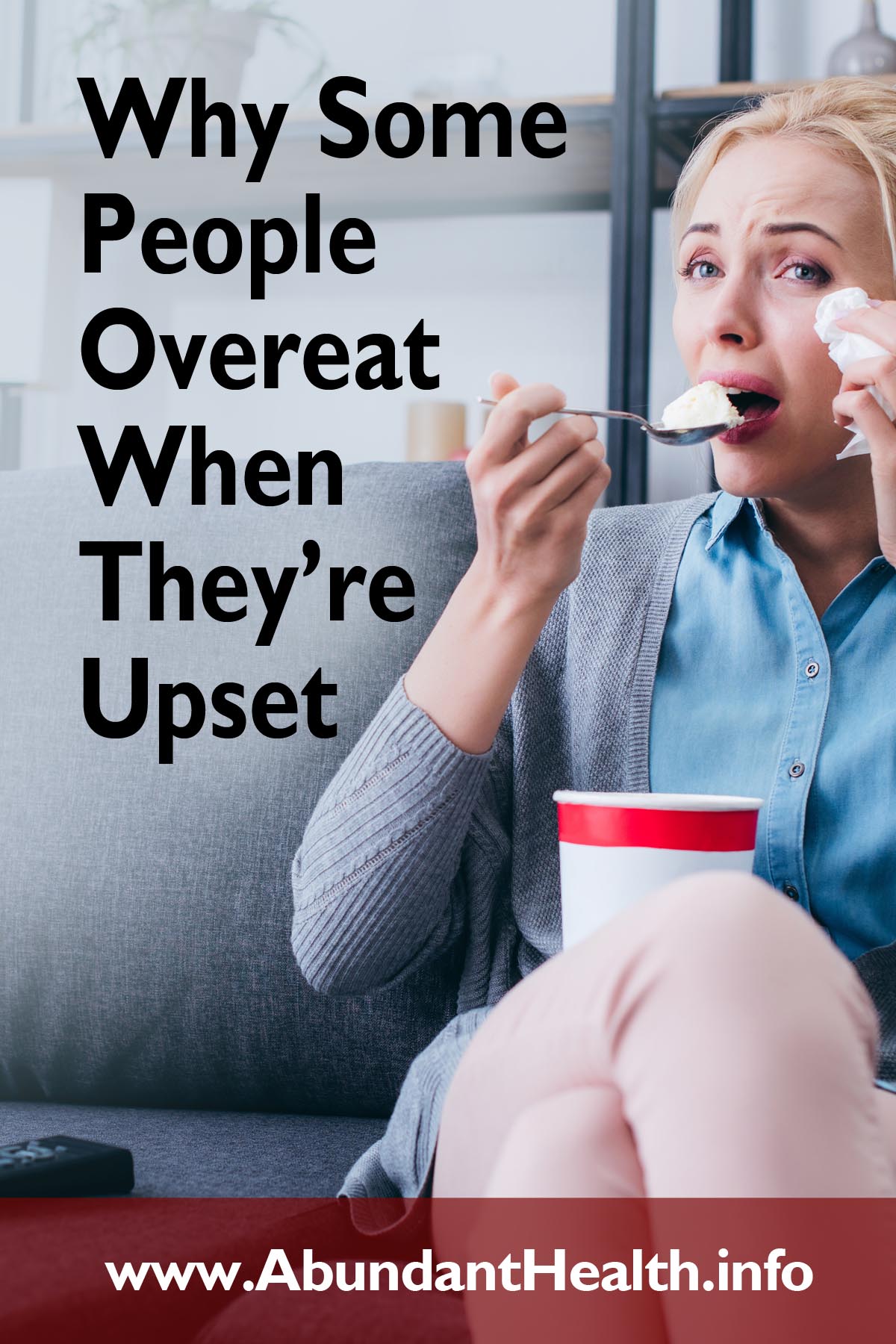The idea of eating a tub of ice cream to cope with being upset has become a bit cliche. Though some might not need a tub of chocolate swirl to help perk themselves up again, there do seem to be systematic differences in the way that people cope with upsetting events, with some more likely to find solace in food than others.1)Van Strien T. Causes of Emotional Eating and Matched Treatment of Obesity. Current Diabetes Reports (2018) 18: 35 https://doi.org/10.1007/s11892-018-1000-x

This matters because when eating to cope with negative feelings is part of a broader tendency to overeat, it is likely to be associated with obesity and being overweight.2)Bryant E. J. et.al. Disinhibition: its effects on appetite and weight regulation. https://doi.org/10.1111/j.1467-789X.2007.00426.x More people than ever are now overweight and obese, with recent estimates suggesting that by 2025, 2.7 billion adults worldwide will be affected by obesity, risking health issues such as cardiovascular disease, type 2 diabetes and cancer.
So why do some people manage their emotions with food while others don’t? One psychological concept that helps to explain this difference is adult attachment orientation.3)Lopez, F. G., & Brennan, K. A. (2000). Dynamic processes underlying adult attachment organization: Toward an attachment theoretical perspective on the healthy and effective self. Journal of Counseling Psychology, 47(3), 283–300. https://doi.org/10.1037/0022-0167.47.3.283 Depending on the extent to which we fear abandonment by those we love, adults fall somewhere on the dimension of “attachment anxiety”. Where we fall on this dimension (high or low) determines a set of expectations about how we and others behave in personal relationships. These are developed as a response to the care we received as an infant and this can characterize your attachment style.
A recent meta-analysis – a study bringing together the results of many other studies – showed that the higher a person’s attachment anxiety, the more they engage in unhealthy eating behaviours, with a knock-on effect on body mass index (BMI).4)Faber A. et.al. Attachment and eating: A meta-analytic review of the relevance of attachment for unhealthy and healthy eating behaviors in the general population,
Appetite, Volume 123, 2018, Pages 410-438, https://doi.org/10.1016/j.appet.2017.10.043.
Wilkinson, L., Rowe, A., Bishop, R. et al. Attachment anxiety, disinhibited eating, and body mass index in adulthood. Int J Obes 34, 1442–1445 (2010). https://doi.org/10.1038/ijo.2010.72 Two other studies have also shown that patients undergoing weight loss surgery are likely to have higher attachment anxiety scores than a comparable lean population, and it is thought that this difference is partly explained by the tendency to overeat.5)Nancarrow, A., Hollywood, A., Ogden, J. et al. The Role of Attachment in Body Weight and Weight Loss in Bariatric Patients. OBES SURG 28, 410–414 (2018). https://doi.org/10.1007/s11695-017-2796-1
Wilkinson, L., Rowe, A., Sheldon, C. et al. Disinhibited eating mediates differences in attachment insecurity between bariatric surgery candidates/recipients and lean controls. Int J Obes 41, 1831–1834 (2017). https://doi.org/10.1038/ijo.2017.157

Understanding attachment anxiety
For a long time, we have known that people who are have high attachment anxiety are more likely to both notice upsetting things and find it harder to manage their emotions when upset.6)Mikulincer, M. (1998). Adult attachment style and affect regulation: Strategic variations in self-appraisals. Journal of Personality and Social Psychology, 75(2), 420–435. https://doi.org/10.1037/0022-3514.75.2.420 This is because of how attachment orientations come about in the first place. The dynamics and feelings relating to our most important long-term relationships, including in early life, act as a templates that guide our behavior in subsequent relationships and in stressful situations.
If we receive consistent care from a caregiver, which includes helping us to cope with problems in life, we develop a secure attachment orientation. For people high in security, when a negative life event occurs, they are able to seek support from others or soothe themselves by thinking about the sorts of things that their caregiver or other significant person would say to them in that situation.

However, inconsistent care – where the caregiver sometimes responds to another’s needs but at other times does not – leads to attachment anxiety and a fear that our needs won’t be met. When negative life events occur, support from others is sought but perceived as unreliable. People with high attachment anxiety are also less able to self-soothe than people with a secure attachment.
We recently tested whether this poor emotional management could explain why people with attachment anxiety are more likely to overeat. Importantly, we found that for people high in attachment anxiety it was harder to disengage from whatever was upsetting them and to get on with what they were supposed to be doing. These negative emotions were managed with food and this related to a higher BMI.7)Laura L. Wilkinson, Angela C. Rowe, Eric Robinson, Charlotte A. Hardman, Explaining the relationship between attachment anxiety, eating behaviour and BMI, Appetite, Volume 127, 2018, Pages 214-222, https://doi.org/10.1016/j.appet.2018.04.029
It is important to note, however, that this is only one factor among many that can influence overeating and BMI. We cannot say that attachment anxiety causes overeating and weight gain. It might be that overeating and weight gain influences our attachment orientation, or it could be a bit of both.
Managing eating behavior
There are two approaches that appear promising for attachment anxious individuals seeking to manage their eating behavior. These involve targeting the specific attachment orientation itself and/or improving emotion regulation skills in general.

To target attachment orientation, one possibility is a psychological technique called “security priming” designed to make people behave like “secures”, who cope well with negative life events.8)Omri Gillath, Gery Karantzas, Attachment security priming: a systematic review, Current Opinion in Psychology, Volume 25, 2019,Pages 86-95, https://doi.org/10.1016/j.copsyc.2018.03.001 It results in beneficial effects more generally, such as engaging in more pro-social behaviors. One study showed that priming is related to snack intake. When people are asked to reflect on secure relationships in their life they eat less in a later snacking episode than when asked to reflect on anxious relationships in their life (though this work is very preliminary and needs replicating and extending).9)Wilkinson L. et.al. Eating me up inside: Priming attachment security and anxiety, and their effects on snacking. https://doi.org/10.1177/0265407512468371
Looking at emotion regulation, a recently published paper highlighted the importance of emotional eaters focusing on skills such as coping with stress rather than calorie restriction, when seeking to lose weight. This study did not look solely at those with attachment anxiety, however, so further work is needed explore this further.10)Van Strien T. Causes of Emotional Eating and Matched Treatment of Obesity. Current Diabetes Reports (2018) 18: 35 https://doi.org/10.1007/s11892-018-1000-x
Of course, in an ideal world everybody would have relationship experiences that helped them to develop high attachment security, and perhaps this is a hidden third approach – facilitating better care-giving and interpersonal relationships for all.

Stay Always Up to Date
Sign up to our newsletter and stay always informed with news and tips around your health.
This article is republished from The Conversation under a Creative Commons license. Read the original article.

Laura Wilkinson is an experimental psychologist with a research interest in eating behavior and bodyweight. She is a Senior Lecturer in Psychology at Swansea University.

Angela Rowe is studying in Social Cognitive Psychology at the University of Bristol. Her research broadly centers on the processes and mechanisms that drive adult attachment styles.

Charlotte Hardman is a Senior Lecturer in Psychology of Appetite and Obesity at the University of Liverpool. Her research examines the psychological and biological control of appetite, food intake and addictive behaviors.
References
| ↑1, ↑10 | Van Strien T. Causes of Emotional Eating and Matched Treatment of Obesity. Current Diabetes Reports (2018) 18: 35 https://doi.org/10.1007/s11892-018-1000-x |
|---|---|
| ↑2 | Bryant E. J. et.al. Disinhibition: its effects on appetite and weight regulation. https://doi.org/10.1111/j.1467-789X.2007.00426.x |
| ↑3 | Lopez, F. G., & Brennan, K. A. (2000). Dynamic processes underlying adult attachment organization: Toward an attachment theoretical perspective on the healthy and effective self. Journal of Counseling Psychology, 47(3), 283–300. https://doi.org/10.1037/0022-0167.47.3.283 |
| ↑4 | Faber A. et.al. Attachment and eating: A meta-analytic review of the relevance of attachment for unhealthy and healthy eating behaviors in the general population, Appetite, Volume 123, 2018, Pages 410-438, https://doi.org/10.1016/j.appet.2017.10.043. Wilkinson, L., Rowe, A., Bishop, R. et al. Attachment anxiety, disinhibited eating, and body mass index in adulthood. Int J Obes 34, 1442–1445 (2010). https://doi.org/10.1038/ijo.2010.72 |
| ↑5 | Nancarrow, A., Hollywood, A., Ogden, J. et al. The Role of Attachment in Body Weight and Weight Loss in Bariatric Patients. OBES SURG 28, 410–414 (2018). https://doi.org/10.1007/s11695-017-2796-1 Wilkinson, L., Rowe, A., Sheldon, C. et al. Disinhibited eating mediates differences in attachment insecurity between bariatric surgery candidates/recipients and lean controls. Int J Obes 41, 1831–1834 (2017). https://doi.org/10.1038/ijo.2017.157 |
| ↑6 | Mikulincer, M. (1998). Adult attachment style and affect regulation: Strategic variations in self-appraisals. Journal of Personality and Social Psychology, 75(2), 420–435. https://doi.org/10.1037/0022-3514.75.2.420 |
| ↑7 | Laura L. Wilkinson, Angela C. Rowe, Eric Robinson, Charlotte A. Hardman, Explaining the relationship between attachment anxiety, eating behaviour and BMI, Appetite, Volume 127, 2018, Pages 214-222, https://doi.org/10.1016/j.appet.2018.04.029 |
| ↑8 | Omri Gillath, Gery Karantzas, Attachment security priming: a systematic review, Current Opinion in Psychology, Volume 25, 2019,Pages 86-95, https://doi.org/10.1016/j.copsyc.2018.03.001 |
| ↑9 | Wilkinson L. et.al. Eating me up inside: Priming attachment security and anxiety, and their effects on snacking. https://doi.org/10.1177/0265407512468371 |
Leave a Reply